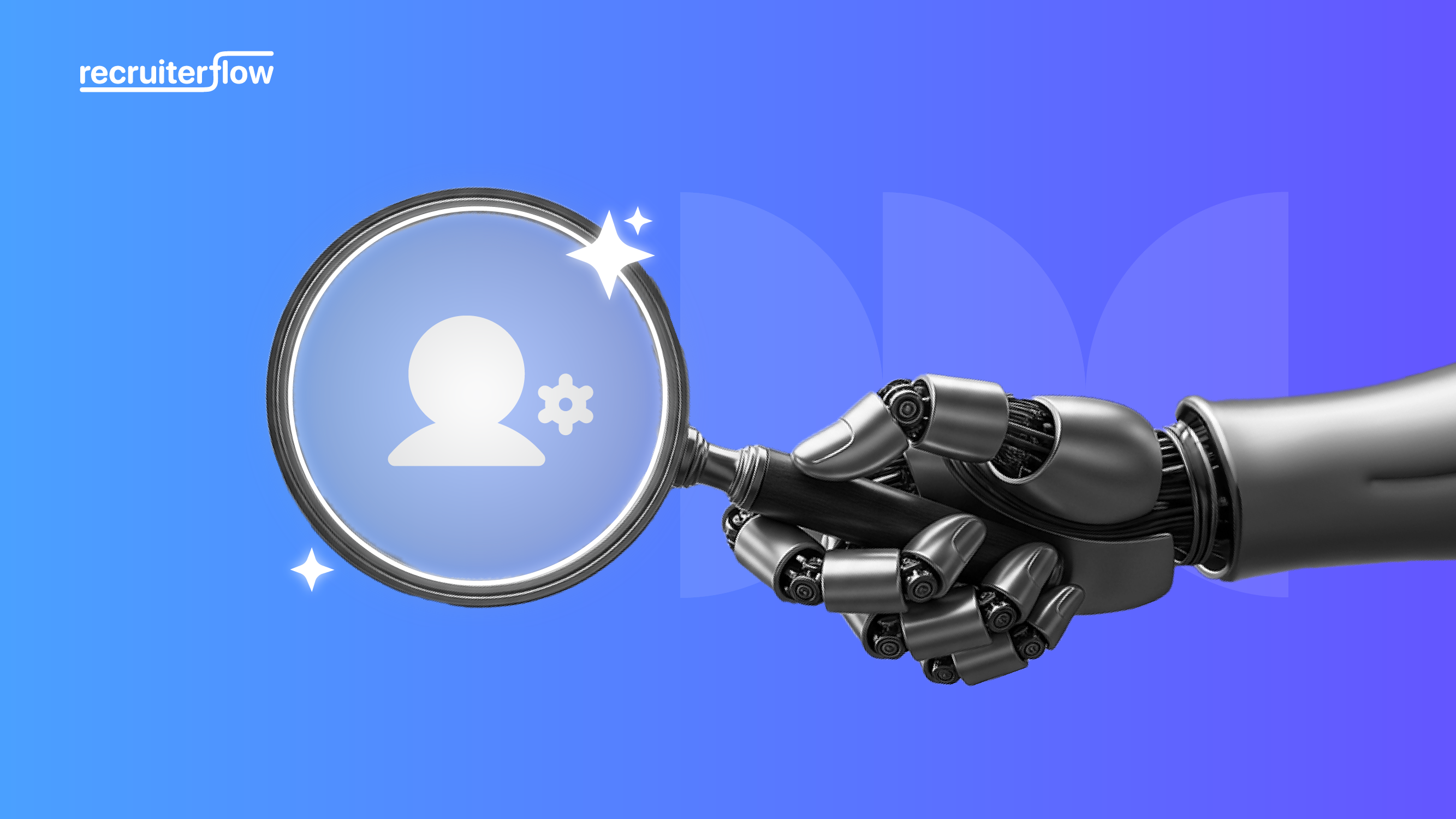
The Most Comprehensive AI Recruiting Guide Ever Made!
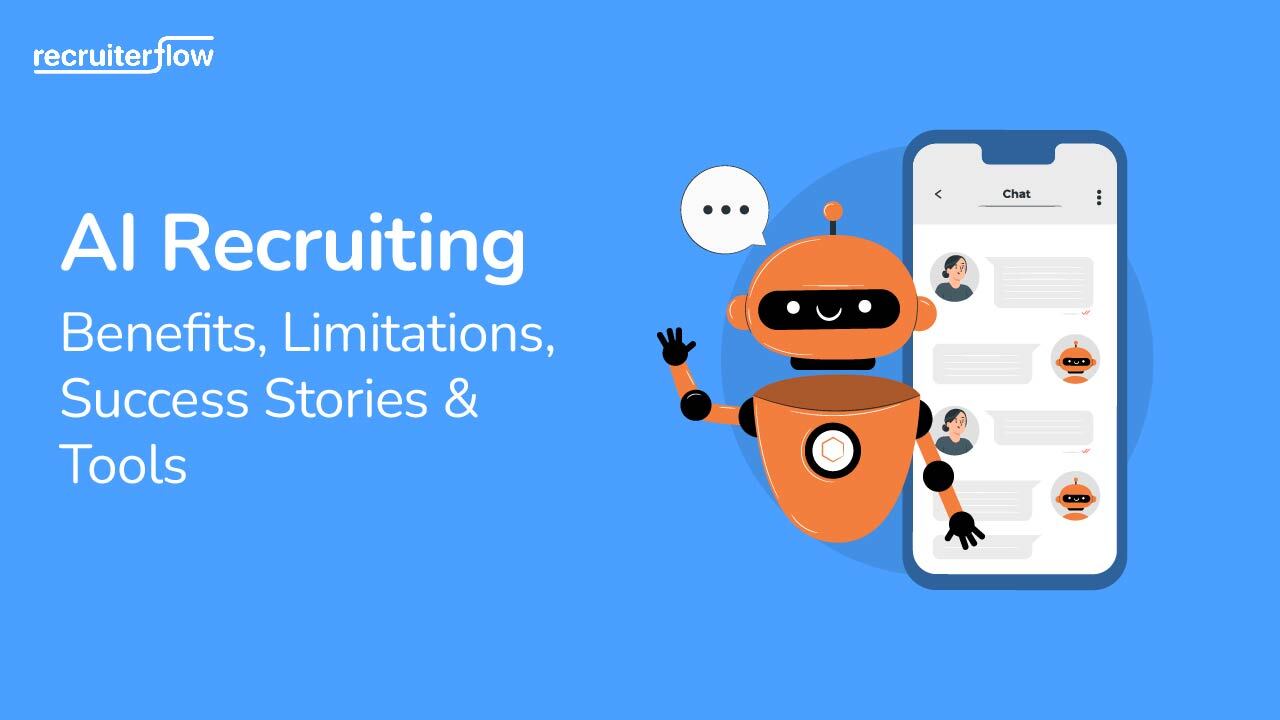
AI recruiting has transformed the traditional recruitment approach. Over a third of hiring leaders have embraced AI in recruitment, and 40% are investing to upskill their talent force by integrating AI into their systems.
AI empowers recruitment agencies to address their clients’ recruiting needs effectively – from expediting candidate sourcing to refining the candidate experience.
In this article, we’ll understand what AI recruiting is and isn’t, explore the benefits, challenges, followed by real-life use cases of AI across recruitment stages, followed by a list of top AI recruitment tools for 2026 and beyond.
What is AI Recruitment — and what it is not?
AI in recruiting refers to applying artificial intelligence to optimize and automate various hiring processes and make better decisions. AI evaluates and processes a large amount of data from the recruitment market and uses that to identify patterns, recruitment trends, and insights and augment human-like thinking capabilities.
At it’s core, AI recruitment is the practice of using artificial intelligence at different stages of the recruitment funnel — right from sourcing and screening to engagement and offer negotiation.
The way we look at it, AI recruitment is a way for recruiters to focus on the ‘human’ aspects of the recruiting process, while AI takes care of the ‘robotic’ tasks such as updating meeting notes, setting up calendars etc..
With AI, recruiters can focus on more decisions and less or no admin.
Cut admin work, increase placements and let your recruiters focus on conversations, not spreadsheets. Discover how with Recruiterflow AI.

More Decisions. More Conversions. Less Admin.
AI in recruitment is taking over the repetitive admin tasks that hold recruiters back from doing what they do best — connecting the right candidates with the right jobs.
Tasks such as logging notes, writing emails, creating job descriptions are already a thing of the past. With the right AI recruiting tools, you can now create effective and personalized emails.
The future of recruiting isn’t between man or machine — it’s man and machine.
Benefits of using AI in recruitment
Reduce Recruiter Burnout
According to Recruiterflow’s research, 61% of recruiters agree they are burnt out and 45% consider repetitive, admin work as the primary reason for burnout. The biggest benefit of using AI is in terms of efficiency and output. AI can take over the repetitive admin work that lead to recruiter burn out.
Increase Recruiter Productivity
With admin work out of the way, recruiters can focus on doing what they do best: placing candidates. By implementing AI, recruiters can double their productivity.
30% reduction in time to source
With AI recruiting, recruiters can secure top talent before your competition does!
Recruiters can significantly reduce the time spent on sourcing by around 30% with AI. This means you can identify and engage with potential candidates faster than ever before.
Better candidate experience
You might wonder—how can less human interaction lead to a better experience for candidates?
Many AI tools in recruiting are specifically designed to fast-track the hiring process. When job seekers can quickly and easily find the information they need, they’re more likely to engage with your organization.
For example, chatbots streamline the interview process, eliminating back-and-forth emails. You can enable the chatbot to ask structured questions, evaluate responses in real-time, and provide instant feedback to candidates.
Improve hiring metrics
Performance metrics in recruitment typically fall into two main categories: quantitative and qualitative. Quantitative metrics focus on measurable outcomes, such as time-to-hire and conversion rates, while qualitative metrics assess factors like candidate experience and quality-of-hire.
Recruitment automation tools and AI-powered solutions streamline the end-to-end hiring process, reducing manual tasks and improving efficiency. This leads to faster “time-to-hire” and higher conversion rates, as recruiters can quickly identify and engage top talent.
They also enhance the candidate experience by reducing friction and simplifying the application process. This not only keeps top talent engaged but also enhances the employer brand, making it more appealing to prospective candidates. This leads to an improved “quality-of-hire” metric.
AI Recruitment Across Different Stages
The best thing about AI in recruitment is that it can be used singularly for each stage or interchangeably between two or more stages of the candidate journey. Let’s understand how AI can be used across different stages.
AI Sourcing
AI sourcing is the practice of using AI to identify and engage candidates. It’s a proactive method of using technology to source candidates at scale. In fact, even the big players are investing in AI for sourcing. Korn Ferry reported a 50% increase in sourcing efficiency with their platform Nimble Recruit. Here’s a breakdown to differentiate between AI sourcing and the usual sourcing.
| Aspect | Candidate Sourcing | AI Candidate Sourcing |
| Sourcing Process | Manual and time-consuming | Automated and efficient |
| Data Insights | Human dependency to analyze data and identify insights | Algorithms that create in-depth analysis instantly |
| Candidate Matching | Basic filters based on keywords and job titles | Advanced matching based on skills, experience, and patterns |
| Speed | Slower due to manual tasks | Faster with real-time processing of candidate data |
| Scalability | Limited by human capacity | Easily scalable to process large volumes of data |
| Candidate Engagement | Generic and often time-intensive | Personalized and automated communication |
| Error Rate | Higher due to manual oversight | Lower with data-driven precision |
| Insights and Decision-Making | Limited by subjective judgment | Data-driven insights for better decision-making |
AI Screening
AI screening is the next step of the recruitment process. Once a recruiter has sourced enough candidates, it is time to identify the best fits. AI Screening helps recruiters manage large volumes of resumes effortlessly without oversight. With AI screening, the same recruiter can easily screen 10X more candidates without burning out.
Advantages of AI Screening for Recruitment Agencies
43% of recruiters believe that AI screening saves them time — and it makes sense, with AI on the side, the same recruiter can screen the resumes in a much shorter time. The best part is the AI screening helps to remove bias and helps to identify the best fits for the role.
AI Screening also improves the submittal-to-hire ratio. It reduces the cost per hire by at least 30% and improves hiring efficiency exponentially.
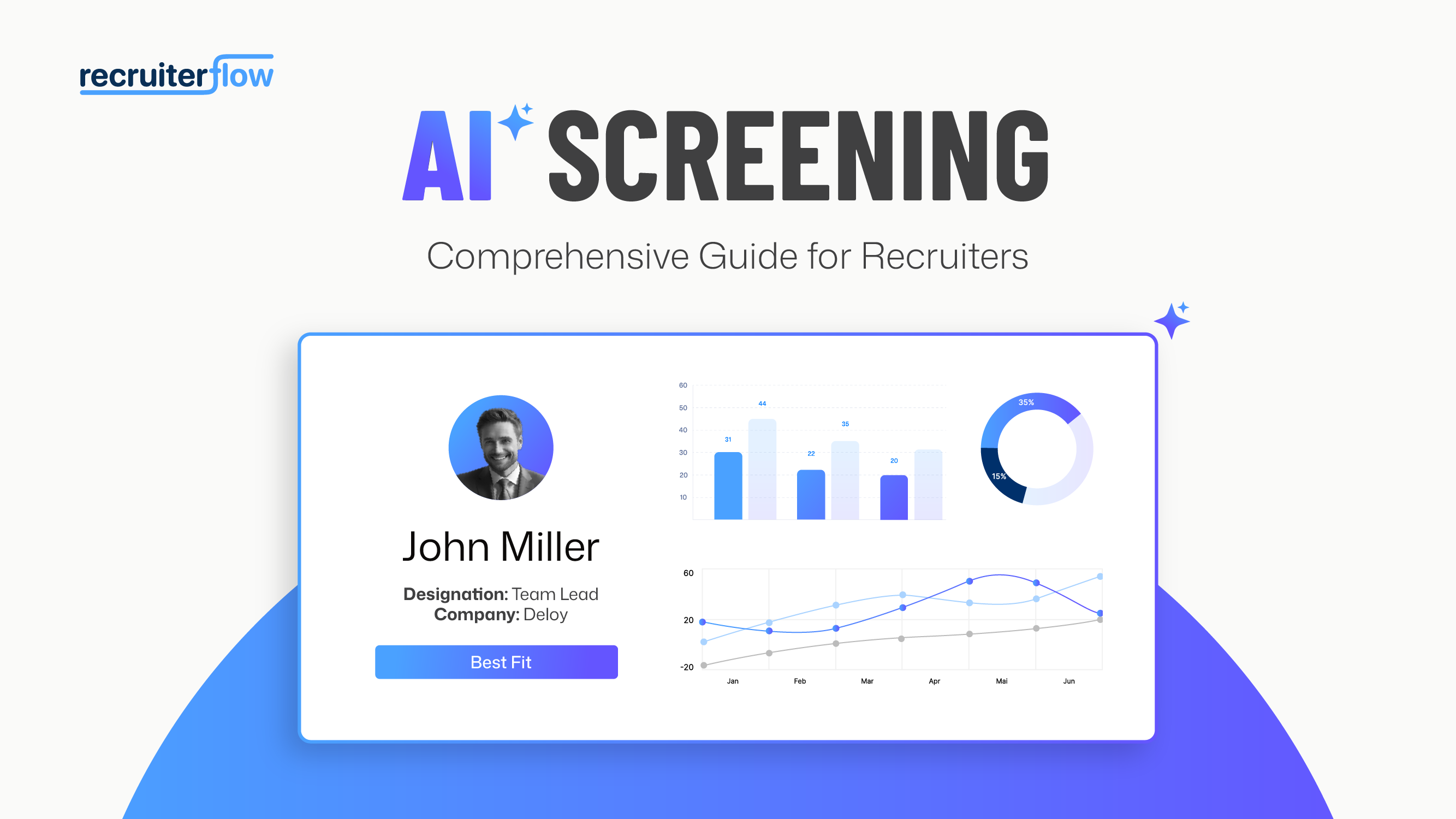
AI Screening on Recruiterflow
Say you are hiring a Senior Software Engineer for a client. With Recruiterflow’s AI Matching feature, you can identify the best candidates from your existing database in just a few clicks. Here’s how:
- Once a job is created on Recruiterflow, head over to the AI Matches feature and click on the Generate button. The AI will then read all the details related to the job (job description, email conversations, meeting notes etc.).

- Then, the AI will look through the database to identify the best candidates. Users can add filters to shortlists based on recent activity, past interaction among other filters.

- You can review the shortlisted candidates and add them to the job in a single click. In fact, you can even add them to an automated sequence using recipes on Recruiterflow.

Also Read: AI Candidate Matching: A Complete Guide
Using AI for Candidate Engagement
You might wonder—how can less human interaction lead to a better candidate experience?
Many AI tools in recruiting are specifically designed to fast-track the hiring process. When job seekers can quickly and easily find the information they need, they’re more likely to engage with your organization.
For example, chatbots streamline the interview process, eliminating back-and-forth emails. You can enable the chatbot to ask structured questions, evaluate responses in real-time, and provide instant feedback to candidates.
According to a Korn Ferry survey, 43% of companies reported improved candidate engagement after using AI.
Hays launched an AI chatbot that improved the candidate response rates by 41%. The biggest advantage of using AI for candidate engagement is reducing the down time. When candidates gets updates regularly, they are less likely to drop off or even ghost.
Real World Impact of AI for Candidate Engagement
PAC Solutions is a boutique recruitment firm that operates as an extension of their client’s internal HR team. To reduce the candidate drop-off rates, they used Recruiterflow’s AIRA (AI recruiting assistant) to create personalised outreach at scale — ensuring candidates are never left guessing.
PAC Solutions also uses automation to schedule well-timed follow-ups across different channels, share job pipeline updates with clients in real time, and keep all stakeholders engaged.
You can read the entire story here: How PAC Solutions Doubled Their Placements with Recruiterflow
AI for Client Engagement
AI is not just limited to candidates, it can also be used for client engagement. A few use cases include:
- Predictive analytics and insights: AI can analyse past data to identify trends, patterns, and identify growth opportunities.
- Company research: With Recruiterflow’s AI Research Agent, recruiters can gathers intelligence on people and companies before any outreach to offer unique insights to close deals.
- Personalised outreach: Recruiters can create personalised email outreach, one that doesn’t feel robotic.
The Role of AI Based on Role Complexity and Hiring Volume
The role of AI and AI Agents differs vastly based on the recruitment type. The graph below explains the correlation between the role of AI Agents and the hiring volume and role complexity.
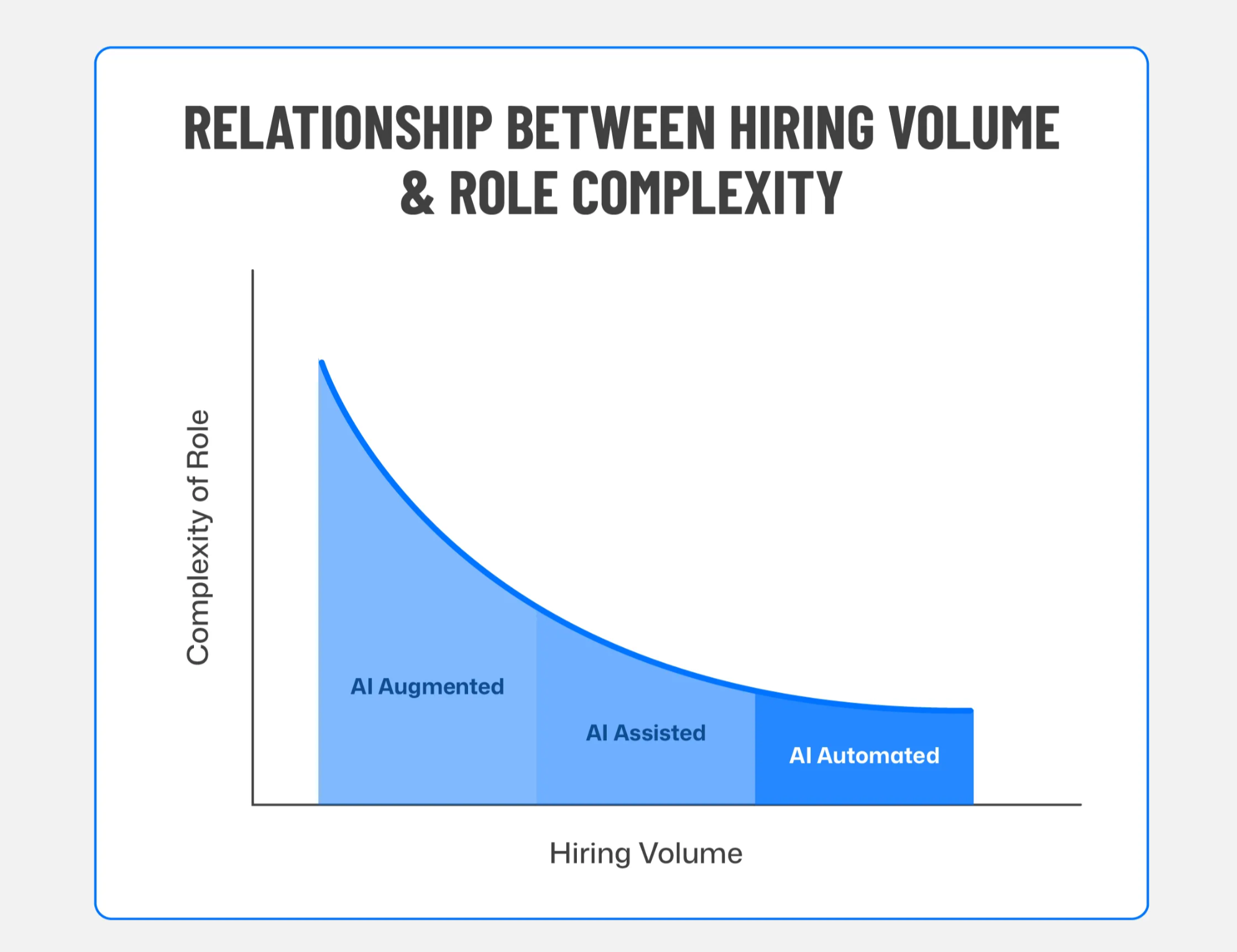
High-complexity roles such as CXOs, VPs, and niche specialists require judgment, storytelling, and precision. The human aspect of recruitment is the key here.
High-volume roles such as front-desk receptionists, delivery executives, and call center associates need quick filtering, velocity, and relentlessness. That’s where AI can help recruitment agencies move quickly with high precision.
Here’s how this correlation works out for different recruitment businesses:
AI for Executive Search
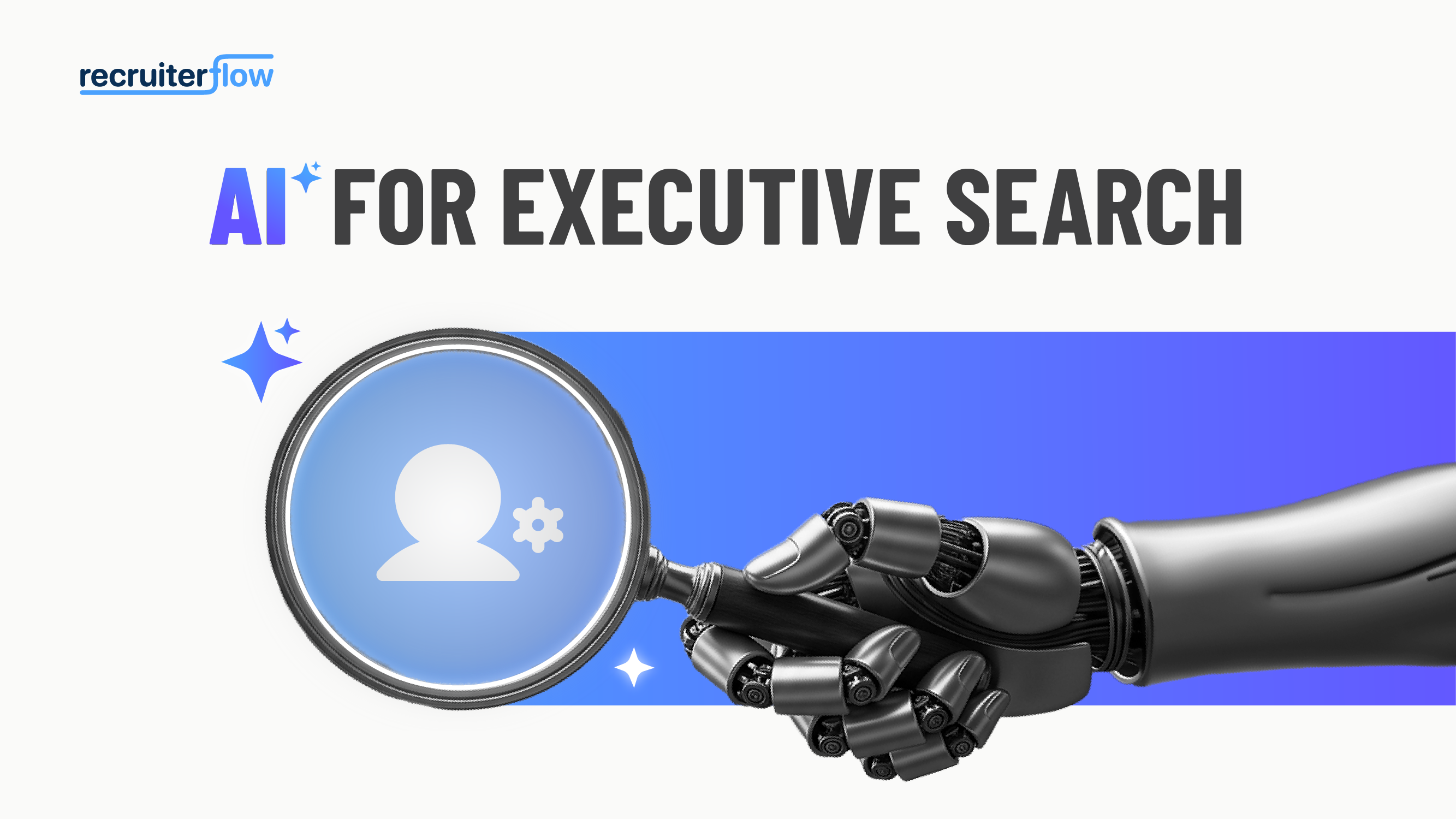
Executive search hiring isn’t just about finding a candidate. The stakes are much higher and the cost of a bad hire is far reaching. At it’s core, AI for executive search goes beyond keyword matching.
It helps recruiters build a foundation for a long-lasting relationship — it’s about the nuances like motivation, behaviour analysis, past records, and strategic insights.
Recruiters can truly focus on building a relationship while AI takes over the entire admin process such as updating meeting notes in the CRM, setting up follow-up calls etc. For instance, with AI candidate matching, executive search firms can identify candidates much faster while an agent (like Recruiterflow’s AI Research Agent) finds insights about the candidate. This ground work can be used to create highly personalised communication.
Also Read: How AI for Executive Search is Transforming Recruitment
Impact of AI for Recruitment Agencies
Globally, 81% recruiters are using AI in one way or the other. In fact, public listed companies like Korn Ferry, Randstad, Manpower Group, and Hays are investing heavily in AI.
The immediate impact of AI is efficiency and output.
Best AI Recruiting Software in 2026
1. Recruiterflow: AI-First Platform Built for Recruitment Agencies
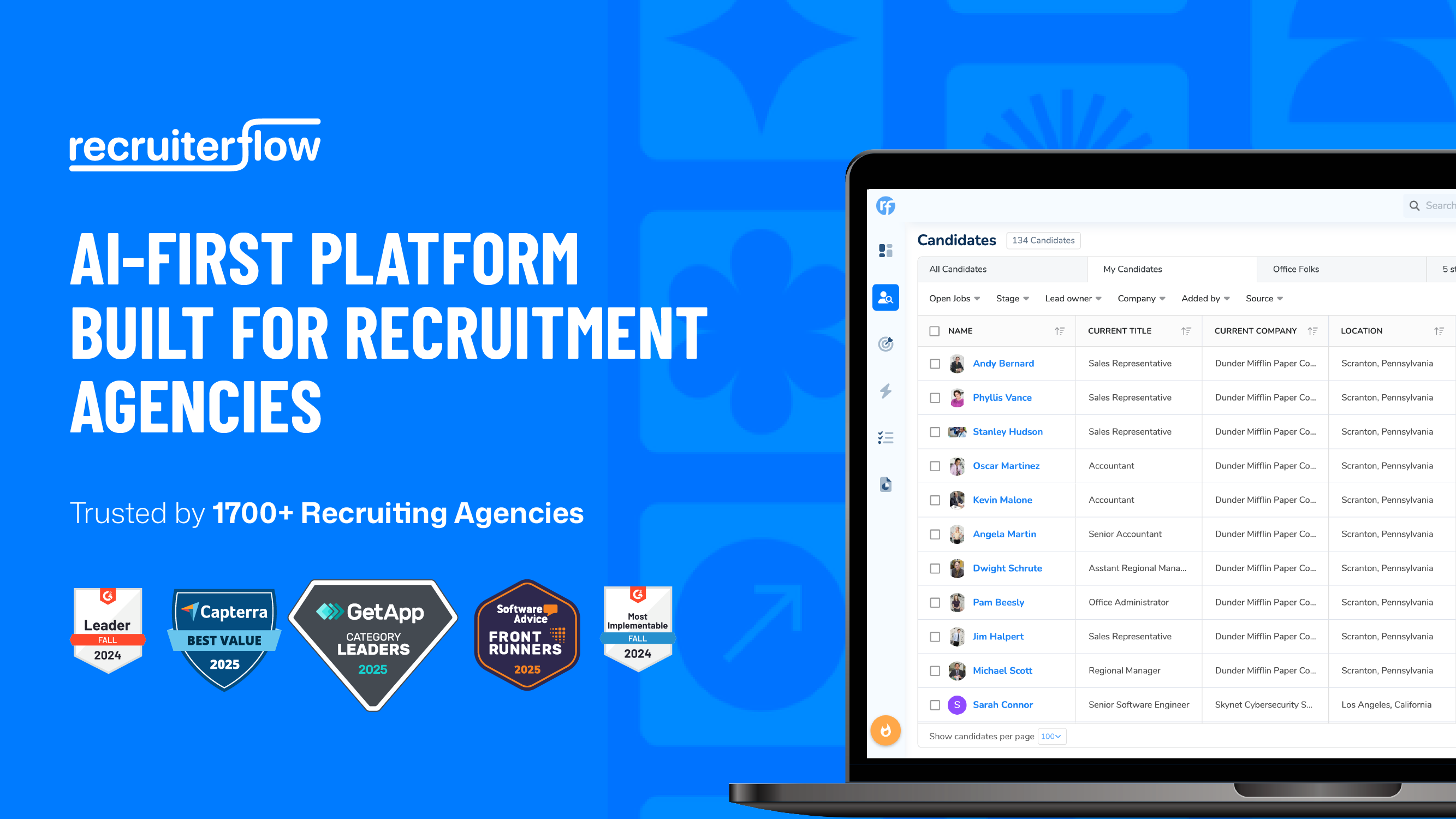
Recruiterflow is an end-to-end solution for staffing and executive search firms with a cutting-edge Applicant Tracking System (ATS) and CRM platform. It facilitates the effective tracking of candidate data, offering insights into the candidate pipeline and managing candidates through an activity log.
It comes with an inbuilt email sequencing tool that helps users engage with potential candidates through personalized email sequences.
The resume formatting feature helps you create submittal-ready resumes and hide sensitive information on the resume.
Price: Starts from $119/month per user
Recruiterflow’s ATS & CRM is Rated 4.8/5 on Capterra.

2. Smart sourcing by Indeed
Indeed’s recently introduced smart sourcing tool uses advanced matching technology and AI to help expedite the talent-sourcing process, without losing personal touch. Now, you don’t have to manually filter through resumes—the algorithm will match active candidates to your open roles.
Moreover, you get features like:
- AI-powered messaging to generate a customized message based on the content of the candidate’s resume and your job posting.
- Collaborative task management to invite collaborators to sourcing projects and accelerate the candidate feedback process.
Price: Custom
Also, read our listicle on the best recruiting automation software.
3. Betterleap
Betterleap is an AI-powered outbound recruiting platform that helps recruiters source candidates and reach out to them effectively. You can even collaborate with recruiters outside of your organization all from one platform.
- The Chrome extension allows you to source candidates with one click.
- You can create multi-step mail sequences using GenAI.
- All candidate communication is centralized, so you can speed up the feedback loop.
Price: Custom
4. Interviewer.AI
Interviewer.AI is an asynchronous video interview platform that uses Explainable AI to pre-screen and shortlist candidates. The software analyzes the key factors of potential candidates, including psychological and technical aspects, giving you more time to focus on critical tasks.
Price: Custom
You can also read our guide on AI screening and its benefits to learn how AI is transforming recruiting.
5. Test Gorilla
Test Gorilla is a pre-employment test platform that’s designed to replace resumes in hiring. Their talent assessment library helps you dig deeper into evaluating candidates skills, behavior, and culture.
- You can create high-quality assessments from their vast library of tests and your custom questions to the mix.
- You can connect with candidates straight from your ATS software and send multiple invites with a single click.
- Price: Starts at $499 per month
6. Joveo
Joveo is a leading AI recruiting platform that helps employers attract, engage, and hire talent more effectively and efficiently. It combines AI-led job advertising, career site creation and management, talent engagement, conversational AI chat, AI interviewing, and advanced analytics.
Joveo supports the entire talent attraction, engagement, and sourcing journey – from amplifying employer brand awareness and advertising roles to nurturing candidate relationships, screening, and optimizing hiring outcomes and ROI.
Pricing – Custom
Challenges of AI for recruiting teams
While AI has a plethora of benefits in recruitment, here are some limitations and challenges recruiters face or have faced in the past with AI.
Biasing
AI algorithms can pick up biases from the data they are trained on. If historical data contains biases related to gender, race, or other factors, AI might log these biases into its algorithm, leading to unfair hiring practices. Over 60% of Americans fear bias and potential discrimination in AI-assisted hiring processes, signaling strong public support for AI regulation and guidelines to ensure equitable AI practices.
For example, back in 2018, Amazon’s recruitment AI started favoring men over women. That’s because Amazon’s computer models were trained to assess job applicants based on patterns observed in resumes submitted to the company over a decade.
Since most resumes came from male candidates due to the tech sector’s male dominance, the system naturally learned to favor male candidates.
Also, read our blog on recruitment marketing to discover strategies that help you attract and engage top talent effectively.
Fear of becoming obsolete
As AI continues to automate and streamline various aspects of recruitment, there’s a legitimate concern among recruiters about AI replacing them.
While 96% of recruiters believe AI can help them in their current jobs, 60% are afraid it will eventually kick them out of work.
Ethical dilemma
Concerns around the fairness, accountability, and transparency of AI’s decision-making processes make it difficult for some recruiters to get on with it.
AI isn’t transparent about how certain decisions are made. Without clear explanations, individuals may feel unfairly treated or discriminated against, losing trust in the recruitment process and the organizations using AI recruitment technology.
Responsible use of AI in recruitment
As AI continues to evolve and revolutionize the recruiting industry, concerns around the ethical implications of AI adoption in recruitment have taken center stage.
The government of the UK has released guidance on the responsible use of AI, offering insights to mitigate bias and discrimination risks for candidates lacking digital skills.
It advises organizations to carefully assess several factors before adopting an AI system, including:
- Identifying the specific challenges they aim to address with AI
- Communicating transparently about AI usage to prospective job applicants
- Evaluating the capabilities of AI systems available in the market
- Determining if employees require training or additional support to use the technology
Leverage AI in recruitment and scale your hiring process
AI is no longer the future—it’s the present! If you haven’t already, it’s time to leverage it in your recruitment process and level up your game.
Recruiters have previously leaned on ATS and recruitment automation. Adding AI into the mix takes their hiring to the next level and supports better decision-making.
Recruiterflow comes with AI-powered features such as advanced search, resume parsing, resume formatting, AI-supported outreach, and more to help you streamline repetitive tasks.






Abhishek Sharma